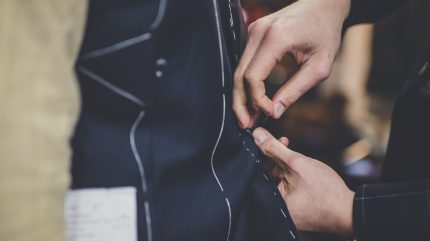
Newless aims to reduce fashion’s negative environmental impact by making upcycling more accessible and appealing to a wide audience of fashion lovers.
The company explained that between the vast amount of unworn garments in wardrobes across the country, and the desirability barriers for consumers to shift from fast fashion to sustainable fashion, the Newless method provides a creative and easy-access gateway for fashion lovers to get involved in sustainable fashion in a more compelling way; by breathing new life into old clothes.
Newless will use experiential upcycling in two distinct ways to combat textile waste and garment fatigue:
- Mail-in service: Customers mail-in their preloved garment and have them undergo the ‘On Demand’ service, upcycling their old product into something new. After a customer purchases the desired style on the website they receive a mail-in kit to provide all the details for their custom garment and a pre-labeled bag to send back their original piece. Within 5 days, Newless designers have upcycled the piece into a completely new style and it’s back in their wardrobe.
The starting price for the On Demand service is £70 and will go up to £150. - Pop-ups: With regular pop-ups that provide the opportunity for users to have their pieces upcycled live by emerging designers in under 90 minutes, it’s a social experience with guests getting to collaborate with the designers to create a bespoke piece while sipping drinks and socialising with friends. Newless will host pop-ups regularly both independently and in partnership with brands looking for a sustainable and social way to activate their physical spaces. The customer price for a spot at a pop-up ranges from £40-90, and this includes their upcycling costs.
The company highlighted that against the backdrop of fast-fashion, mass consumption and hot-then-not trend cycles, millions of tonnes of textile waste is being created annually. According to WRAP, 75% of garments are not used again after their initial 6 months of wear, and the average Brit does not wear approximately 25% of their wardrobes.
Newless, founded by Anita Shannon, shared it employs emerging UK designers to come up with creative ideas to reconstruct garments, taking items from feeling “outdated and undesirable” to clothes that their owners will want to wear again.
The company said it is also supporting an emerging talent pool of UK designers through their business.
“As we reckon with fashion’s impact on the environment, it seems our choice is split between cheap, trendy, fast fashion or expensive, and often simple, sustainable clothing,” exclaimed Shannon. “At Newless we are proving that upcycling can be accessible to many through an engaging ecommerce style experience via On Demand. This, in tandem with our pop-ups, is proof that lower impact, fashion-forward styling can exist, be fun, and be available at an affordable price point.”
Newless added it has run a number of successful pop-up pilots with organisations and brands in London, and upcoming event dates are available to view on the Newless website and Instagram.
Recently, German sports retailer Puma scaled its textile-to-textile recycling innovation RE:FIBRE to make all its replica football kits with a minimum of 75% recycled textile waste.



